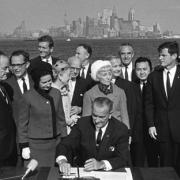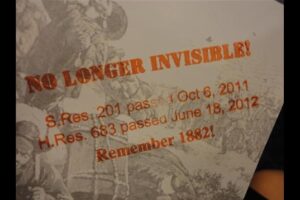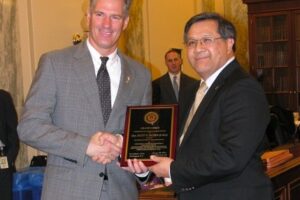 December 17: A Date to Remember
December 17: A Date to Remember
December 17 should be a day of remembrance and celebration. This was the date that the Chinese exclusion laws were repealed in 1943, sixty years after the 1882 act barred Chinese from immigrating to the United States or becoming American citizens. Congress took this action primarily as a war tactic. It had very little to do with Congress recognizing it had wrongly targeted the Chinese or wanted them to be included in the American community. President Roosevelt’s signing statement made that clear: The exclusion laws were an “unfortunate barrier between allies.” With its removal “the war effort in the Far East can now be carried on with a greater vigor and a larger understanding of our common purpose.” And, to seal the point, legal immigration for Chinese was limited to 105 people per year.
It took another quarter of a decade, for Congress to enact an immigration bill that equably welcomed Chinese to the United States. This was the Immigration and Nationality Act of 1965, also known as the Hart-Celler Act. The act profoundly affected the Chinese American community. It allowed legal migration to meet decades of frustrated demands and gave thousands of forced bachelors and separated families hope for a normal future. The act also altered the entire demographic picture of America. Enacted as part of the Civil Rights Movement of the 1960’s, it confirmed that immigration was as much a civil rights matter as it was about people coming to the United States. Ethnic and cultural diversity in America became in reality a valued strength.
That said, it would be another 50 years, before Congress admitted –in two unanimously approved resolutions in 2011 and 2012 through the 1882 Project led by the Chinese American Citizens Alliance and four national partners –that what Congress did in 1882 was wrong. People should never have been subjected to the laws that the 1882 Exclusion Act imposed upon the Chinese and that were extended to Asians by the Asiatic Zone of Exclusion. Affirmed in the 2011/12 resolutions, Congress had a duty then, as it does today, to protect the civil rights of all people in the United States.
That Congress did not protect the Chinese historically and may falter again for another ethnic or religious group can be understood in the context of presidential politics. As revealed in Forbidden Citizens by Martin Gold from his research for the 1882 Project, fierce competition for electoral votes created the forces that made increasingly harsh laws inevitable and harmfully lasting. A lesson from the Chinese Exclusion Laws is that demagoguery and posturing for votes by candidates pandering to base fears and racism has no place in American politics. But, if in place, it will take decades before consequences are resolved.
There are plenty of vexing issues today that require us and those who seek to lead to keep their wits together. When violent dangers confront us, efforts and statements that reaffirm our fundamental American values are not just about political correctness. They are essential. Instead, political campaigning has fed us assertions of shallow policies and calls for deadly use of power that consider those values to be acceptable collateral damage.
Donald Trump’s call for Muslim exclusion is Denis Kearney’s call for “The Chinese Must Go!” Let us hope that presidential politics do not turn that call into laws that require a future December 17 to repeal. ##




